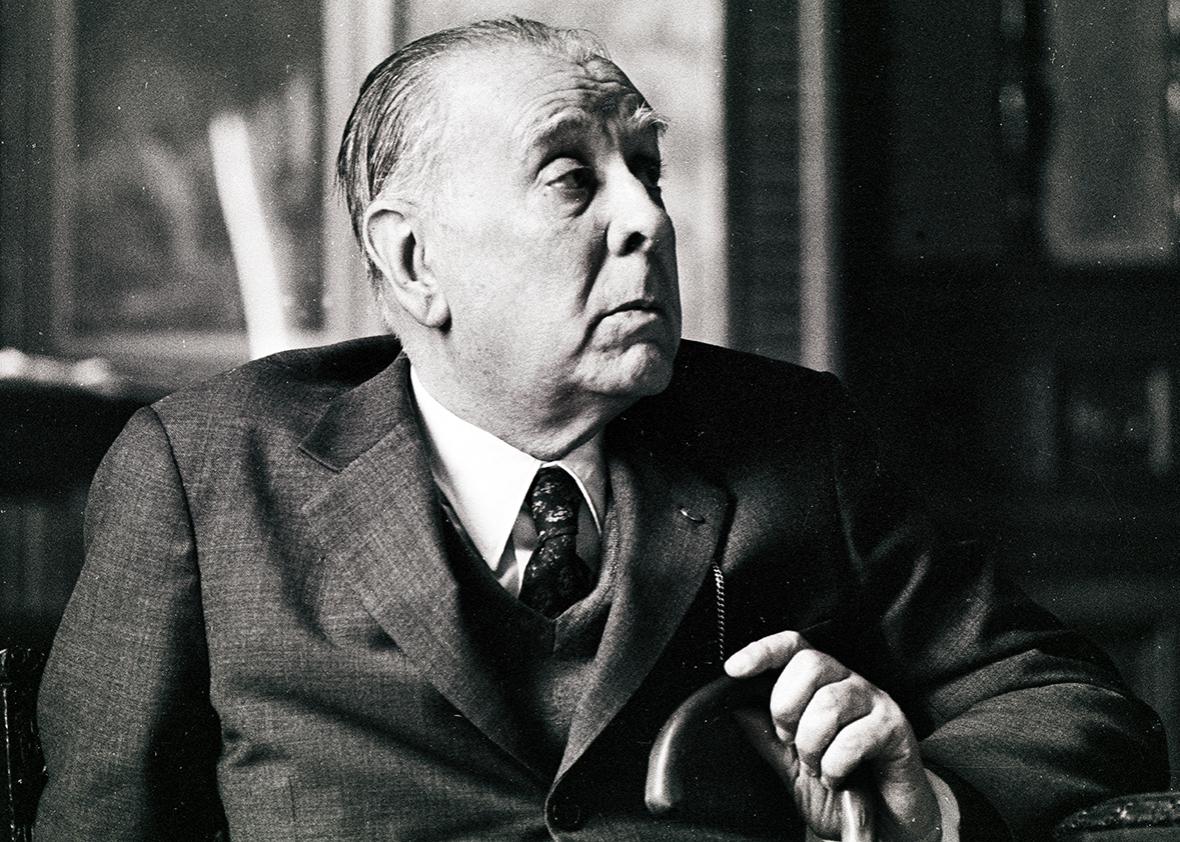This article is part of A Year of Great Books, a Slate Academy. To learn more, read Laura Miller’s introduction to the series, or visit Slate.com/GreatBooks.
“I try my best,” Jorge Luis Borges wrote in at the age of 72, “to write straightforward stories.” This would surprise many of his readers, for Borges, the Argentinian writer often viewed as the father of magic realism, produced fiction that resembles a cabinet of wonders. An author who strives to structure his life and personality so that he might reproduce, word for word, the work of another author. A nation whose language has no nouns. A cosmic library containing all possible variations on a 410-page book. A man who discovers that he exists only in someone else’s dreams. Borges’ stories are philosophical, metaphysical, the stuff of long, late-night conversations over bad diner coffee about the nature of reality, truth, and art.
But it’s also worth noting that—while his work was relatively unknown outside of Latin America until he won an important international literary prize in 1961—Borges had published stories not just in literary journals but also in Ellery Queen’s Mystery Magazine and a science-fiction pulp notorious for its extensive coverage of UFOs. The Mystery Writers of America would give him a special Edgar Allan Poe Award for “distinguished contribution to the mystery genre” in 1976. There’s nothing formidable or mandarin about Borges’ work; he is the people’s modernist, an equal opportunity mind-blower.
Born into a distinguished military family, Borges once remarked that the single most determining event in his life was “my father’s library.” He lived, breathed, and quite possibly also ate books, and as a result, many of his stories have to do with the paradoxes of writing, reading, and language. One of his favorite genres is the imaginary book review—well, the reviews are real enough; it’s the books that are imaginary. He concocted literary forgeries, imitations of other writers, and planted them in collections of the real thing. He never lost the spirit of impishness that makes his writings anything but mere intellectual exercises, as the merry chaos of his 1966 Paris Review interview testifies. “Always there are jokes,” his private secretary informed the interviewer.
Borges was a true cosmopolitan, a speaker and writer in (as well as a translator from) several languages whose family lived off and on in Europe, and yet he also wrote with great depth of feeling about his native Argentina, refusing to regard its culture as provincial. To live on the margins of a Eurocentric world, he believed, was to be set free to claim and transform whatever parts of its culture most interest, inspire, and intrigue you. He was bookish, and worked for many years as a librarian, but it was through books that he became a man of the world.
A major figure in Argentina’s literary scene, Borges often clashed with the political establishments, left and right, from the 1960s onward. He would eventually call himself a conservative, but he was really a classical liberal: He cared most about individual freedom of thought, speech, and pen. It was an era of totalitarian extremes, and he was often at odds with his time.
Injury and loss, catastrophes that might to anyone else seem pure subtractions, became for Borges the opportunity for transcendence. A bump to his head in 1938 became infected, endangering his life and depriving him for a while of the power of speech. But it was after his recovery from that crisis that he began to produce some of the most celebrated stories in Ficciones, “Pierre Menard, Author of the Quixote” and “Tlön, Uqbar, Orbis Tertius.” And when a progressive congenital condition led to his total blindness in the 1950s (he never learned to read Braille), the deprivation only seemed to make him more himself, more Borgesian. Attended by his devoted mother and personal assistants, he traveled the world, basking in a long-delayed literary celebrity but also reflecting, fruitfully, on a long life of reading.
His blindness never seemed to hamper Borges much as a writer. His gaze was always trained inward, on the mind and the soul. What he found there he aimed to describe as straightforwardly as he could, because that’s the only way to do justice to mysteries so beautiful and so immense.
For this episode of A Year of Great Books, we’ll be using the Grove Press edition of Ficciones, translated by Anthony Kerrigan and first published in 1962. However, if you already own another edition of Borges’ work, such as Penguin Books’ Collected Fictions, translated by Andrew Hurley, feel free to use that. Below are the stories contained in the original collection:
“Tlön, Uqbar, Orbis Tertius”
“The Approach to Al-Mu’tasim”
“Pierre Menard, Author of the Quixote”
“The Circular Ruins”
“The Lottery in Babylon”
“An Examination of the Work of Herbert Quain”
“The Library of Babel”
“The Garden of Forking Paths”
“Funes the Memorious”
“The Form of the Sword”
“Theme of the Traitor and the Hero”
“Death and the Compass”
“The Secret Miracle”
“Three Versions of Judas”
“The End”
“The Sect of the Phoenix”
“The South”
